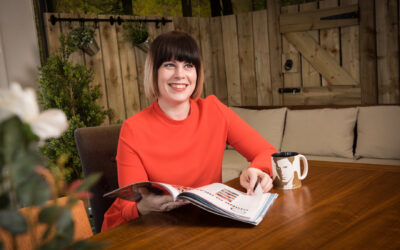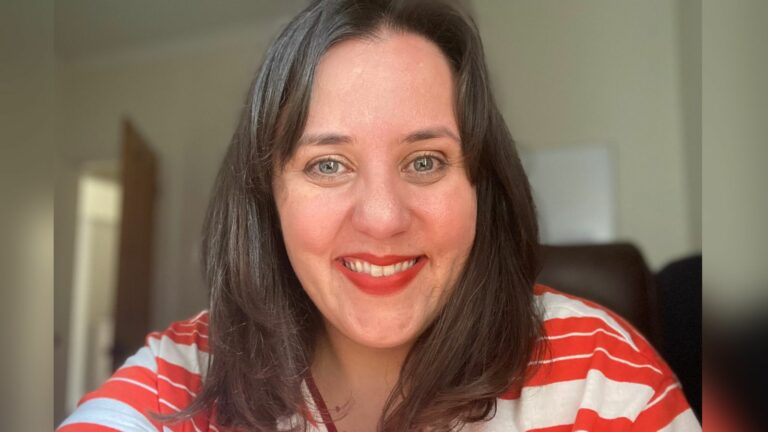Michelle Ewen is one of the co-founders and a Director at PR Consultancy Write on Time.
A former journalist turned PR pro, Michelle co-founded Write on Time alongside her husband Christian in 2017.
Ewen is also the co-founder of the #SheCan365 project – now an award-winning female entrepreneurship blog and crowdfunded book.
Here, she shares her career journey, tips and advice for those wanting to follow in similar footsteps.
How did you first get into your industry?
My first PR role was working as a PR and Publications Officer for an NHS Foundation Trust. At the time, there were more than one million people in our geographical footprint across the North West. I coordinated content for the service user and Foundation Trust membership newsletters; created briefings for the Chief Executive and the Board, local MPs and other stakeholders; and wrote the Trust’s Annual Report.
My primary responsibility, however, was generating positive media coverage for the Trust and helping patients and clinicians to talk publicly about mental health – working in true partnership as Experts by Experience and Experts by Status. My proudest moments included bringing Stephen Fry on board to front my department’s ‘Stamp Out Stigma’ campaign, as well as supporting patients to share their stories in their own words in settings such as schools and prisons. I was eventually promoted to Communications Manager.
What do you love about your job?
Meeting female entrepreneurs who are absolutely convinced they are not newsworthy, and who then go on to be featured in publications that are household names. As a former journalist, I used to crave bylines for myself.
Nowadays, my biggest thrill is teaching businesswomen how to think of a story or feature idea and pitch it with confidence to the press. I have seen women go on incredible journeys – from being featured in their local paper to securing a ‘Dragon’ on Dragons’ Den in front of millions of viewers. It never gets old, that rush of excitement. I have cried many a happy tear for them!
Who – or what – has inspired you in your career?
My mum was a prolific letter-writer and always took me to the library as a child. My dad, in later life, has written three fantastic books and has always encouraged me in my career. I met my husband of 14 years and business partner, Christian, in a newsroom. We shared a desk and lifestyle reporting responsibilities for more than 18 months before we started dating.
Christian moved into PR before I did – becoming what was, at the time, the youngest ever Press Officer to be recruited by his FTSE 100 employer. Christian was incredibly gifted at both reactive and proactive PR. Watching him thrive in that role gave me the confidence to make the leap from journalism myself in 2009. My best friend is also a theatre writer, so the most important people in my life love words as much as I do. That inspires me enormously. It is a very lovely thing to be surrounded by people who excel at communication.
What are the biggest challenges about your job?
The biggest challenge I face every day is helping women to overcome the mindset block that tells them: ‘I am not an expert’. Many consider it to be ‘unBritish’ to ‘blow one’s own trumpet’ and, no matter how much lived experience or qualifications they have, many female entrepreneurs assume that there is always someone else more entitled to talk about a topic than them.
I always say: ‘If a prospective customer enquired about your services, would you tell them: “You would be better off speaking to such-and-such a person; I really don’t know what I am doing?!”’ If you trust that you are ‘expert’ enough to sell products or services, then you are ‘expert’ enough to have a voice in the media about your industry. There are daily opportunities on platforms such as Lightbulb and the Twitter hashtag #Journorequest to put yourself forward as a case study, or to answer a journalist’s question. If you don’t take them, someone else will.
What skills have been the most crucial to you succeeding in your career so far?
So-called ‘soft skills’ have served me well. I love speaking to people of all backgrounds and I have become something of a human confessional! I only have to sit at the bus stop and the person next to me – a complete stranger – will start telling me their deepest secrets. Christian and I are always asked: ‘Are you social workers?’, which we take as a huge compliment because it’s lovely to be able to put people at ease and make them feel heard.
I think my comfort with speaking to people comes from my many, many part-time jobs during my late teens. I have been a bingo caller, a stable hand, a cable salesperson, a cashier, a computer parts procurer… You name it, I’ve done it! I even bought chef’s whites and got a job in a restaurant once – making butties for builders. These experiences made me a better journalist – particularly when I started in the women’s true-life market.
I spoke to women who had been cheated on, assaulted, robbed, medically botched and lost partners and children to murder. You need to be able to put people at ease quickly and create a safe space for them to have those incredibly difficult conversations. This ability helped me when working at the Trust with very vulnerable people, and it helps me to serve female entrepreneurs today.
What was your first salary and what could someone getting into the industry expect to earn nowadays?
I was so focused on having the opportunity to write professionally that the salary for my first job was almost an afterthought. I graduated from university with First Class Honours in Journalism & Script Writing on the Friday and started work the following Monday as a Feature Writer at a national press agency. It was 2001 and my starting salary was £12,000 (equal to my student loan debt).
I come from a working-class background and I had no other source of income – I had to cover all my own living expenses in shared housing in Stratford-upon-Avon. It was an affluent town (certainly compared to my hometown of Warrington) full of expensive wine bars and clothing boutiques. My landlord had a fancy sports car, and tourists would sip champagne on the lawn outside the Royal Shakespeare Theatre.
Financially, I was out of my depth and socially I felt isolated. I returned to the North West within a year and have never left. I love being Northern and everything that stands for, and you can be a success up here too! According to Glass Door, the national average salary for a Features Writer today is £29,098 in the UK.
What education or training would be most useful for someone looking to follow your career path?
There are some PR people who do not have a background in journalism, but I personally find it a huge advantage to have worked in a news agency, a regional newsroom and for the national press. I know what ‘newsworthy’ looks like from a reporter’s perspective and how to make their job easier, which is often the key to securing press coverage.
I have a network of media contacts across the North, as many of the people I have worked with over the years have moved around various publications and news outlets. There are some magazines that I pitch to that I used to edit! Personally, if you want to get into PR, I recommend working in the media in some capacity first so you can understand that world.
I would also put yourself in situations where you are going to interact with people. You need to know how to converse comfortably and to be a good communicator because, while a lot of pitching is done online now, you need to be able to talk with ease to people. You need to gain their trust from the outset so you can go on to really grasp their story, what makes them tick and to understand their voice. Often, you will be writing statements on your client’s behalf, so it always needs to sound like them – not you.
What advice would you have for someone looking to follow your path?
Focus on learning transferrable skills – not sticking to a rigid career path. The golden thread throughout my entire career has been telling stories. It’s the way I do that and who I do it for that has changed. You also need to find ways to build mental resilience, because best-laid plans rarely come to fruition.
The day the UK went into its first national lockdown, Christian and I lost 85% of our entire client base within 24 hours. We used to do PR for businesses and our customers were predominantly in the manufacturing, retail and hospitality sectors. We had no other income source and, as a Limited Company, qualified for little government support. Within a month, we had relaunched – teaching business owners how to do their own PR and sharing all the skills we had learned over nearly 30 years combined.
Today, we have now helped more than 3,000 entrepreneurs to take their first steps to be featured in newspapers and magazines, as well as on the radio, TV and podcasts. Our clients have gained coverage in everything from Psychologies magazine and USA Today to Good Housekeeping magazine and Global Franchise. Working on your mental health, building nurturing networks and being open to coaching and mentoring are definitely the best ways to be successful in business.











